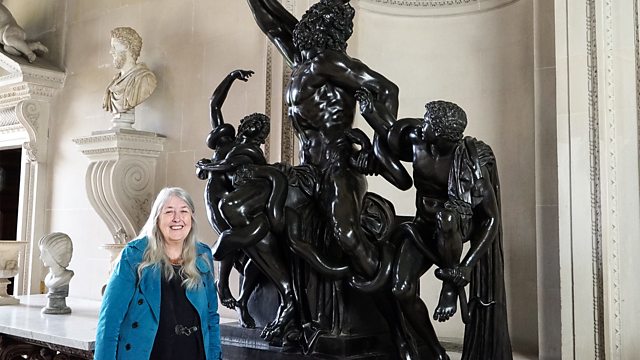Mary Beard’s Forbidden Art episode 1: Classicist and broadcaster Professor Mary Beard explores a broad range of thought-provoking and sometimes controversial works of art that tackle unsettling subjects – works that have been fought over, removed from view or simply ‘forbidden’. She delves into the questions of what, why and how art gets forbidden, who gets to decide and how that has changed over time.
In the first programme, Mary explores some of the challenging ways that artists have shown the human body. She begins with the Romans, heading to the British Museum to discuss a statue of the god Pan having sex with a she-goat, and from there moves through art from the Renaissance to the present day that portrays sex, death, violence and beyond.
Mary meets renowned portraitist Daphne Todd as well as contemporary artists Tracey Emin and Martin Creed to discuss works they’ve produced which feature usually private bodily acts or experiences that, for some, have seemed to go too far. She asks why art which depicts some of those actions common to us all can be so disturbing – and what confronting these works might tell us about being human.
Mary Beard’s Forbidden Art episode 1
Dame Winifred Mary Beard is an English scholar of Ancient Roman civilisation. She is Professor of Classics at the University of Cambridge, a fellow of Newnham College, and Royal Academy of Arts Professor of Ancient Literature. She is the classics editor of The Times Literary Supplement, where she also writes a regular blog, “A Don’s Life”. Her frequent media appearances and sometimes controversial public statements have led to her being described as “Britain’s best-known classicist”. The New Yorker characterises her as “learned but accessible”.
Between 1979 and 1983, Beard lectured in classics at King’s College, London; she returned to Cambridge in 1984 as a Fellow of Newnham College and the only female lecturer in the classics faculty. Rome in the Late Republic, which she co-wrote with Cambridge historian Michael Crawford, was published the following year.
John Sturrock, classics editor of The Times Literary Supplement, approached her for a review and brought her into literary journalism. Beard took over his role in 1992 at the request of Ferdinand Mount.
Shortly after the 11 September 2001 attacks on the World Trade Center, Beard was one of several authors invited to contribute articles on the topic to the London Review of Books. She opined that many people, once “the shock had faded”, thought “the United States had it coming”, and that “world bullies, even if their heart is in the right place, will in the end pay the price”. In a November 2007 interview, she stated the hostility these comments provoked had still not subsided, though she believed it had become a standard viewpoint that terrorism was associated with American foreign policy. By this point she was described by Paul Laity of The Guardian as “Britain’s best-known classicist”.
In 2004, Beard became Professor of Classics at Cambridge. She was elected Visiting Sather Professor of Classical Literature for 2008–2009 at the University of California, Berkeley, where she delivered a series of lectures on “Roman Laughter”. In 2007–2008 Beard gave the Sigmund H. Danziger Jr. Memorial Lecture in the Humanities at the University of Chicago.
